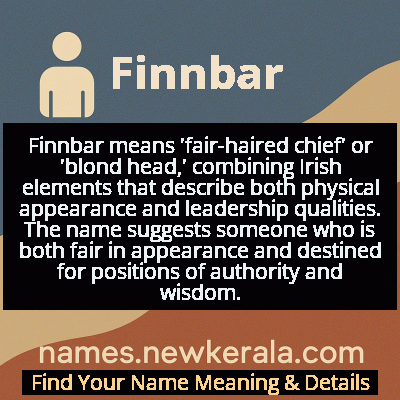Finnbar Name Meaning & Details
Origin, Popularity, Numerology Analysis & Name Meaning of Finnbar
Discover the origin, meaning, and cultural significance of the name FINNBAR. Delve into its historical roots and explore the lasting impact it has had on communities and traditions.
Name
Finnbar
Gender
Male
Origin
Celtic
Lucky Number
1
Meaning of the Name - Finnbar
Finnbar means 'fair-haired chief' or 'blond head,' combining Irish elements that describe both physical appearance and leadership qualities. The name suggests someone who is both fair in appearance and destined for positions of authority and wisdom.
Finnbar - Complete Numerology Analysis
Your Numerology Number
Based on Pythagorean Numerology System
Ruling Planet
Sun
Positive Nature
Leaders, ambitious, highly driven, self-reliant, innovative.
Negative Traits
Overly aggressive, domineering, impatient, selfish.
Lucky Colours
Red, orange, gold.
Lucky Days
Sunday.
Lucky Stones
Ruby, garnet.
Harmony Numbers
2, 3, 9.
Best Suited Professions
Entrepreneurs, managers, engineers.
What People Like About You
Courage, determination, leadership.
Famous People Named Finnbar
Saint Finnbarr of Cork
Religious Leader
Founded monastic school in Cork and became patron saint of the city
Finnbar Saunders
Academic
Renowned physicist and science communicator at University of Oxford
Finnbar O'Connor
Musician
Award-winning traditional Irish fiddler and composer
Finnbar Wright
Opera Singer
Internationally acclaimed Irish tenor with multiple classical recordings
Name Variations & International Equivalents
Click on blue names to explore their detailed meanings. Gray names with will be available soon.
Cultural & Historical Significance
The name's components—'finn' meaning 'fair, white, or blond' and 'barr' meaning 'head' or 'summit'—reflect important Celtic cultural values. Fair hair was admired in ancient Ireland, often associated with nobility and divine favor, while 'barr' suggests leadership and high status. This combination made the name particularly suitable for religious and community leaders, cementing its place in Irish hagiography and local traditions, especially in County Cork where devotion to Saint Finnbarr remains strong.
Throughout Irish history, the name has maintained its connection to education and spiritual leadership, with several churches and schools named after Saint Finnbarr. The name represents the enduring Celtic tradition of combining physical description with character attributes, creating names that tell a story about both appearance and destiny.
Extended Personality Analysis
Individuals named Finnbar are often perceived as possessing natural leadership qualities combined with intellectual curiosity and creative expression. The name's historical association with scholarly saints and community founders suggests someone who is both thoughtful and action-oriented, capable of inspiring others while maintaining a calm, fair-minded approach to challenges. There's an expectation of integrity and wisdom that comes with bearing a name connected to important religious and cultural figures.
Modern bearers of the name often exhibit a blend of traditional values and contemporary thinking, showing respect for heritage while embracing innovation. The 'fair-haired' component of the name's meaning may translate metaphorically into personality traits of clarity, honesty, and transparency in dealings with others. Many Finnbars demonstrate strong communication skills, artistic talents, or academic interests, reflecting the name's scholarly and creative heritage while maintaining the practical leadership qualities suggested by the 'chief' or 'head' meaning.
In social settings, Finnbars are typically seen as balanced individuals—neither overly aggressive nor passive, but rather as natural mediators who can see multiple perspectives. They often possess a quiet confidence that draws others to them for advice and guidance, living up to the name's implication of being a 'fair leader' or 'wise head' in their communities and professional lives.
Modern Usage & Popularity
Finnbar maintains steady but modest usage in Ireland and among the Irish diaspora, particularly favored by families seeking to honor Celtic heritage while choosing a distinctive name. While never reaching top popularity charts, it enjoys consistent use in Ireland, the UK, and North America, often chosen by parents interested in traditional names with strong cultural roots. The name has seen a slight resurgence in recent years as part of the broader Celtic revival movement and increased interest in heritage names. It's particularly popular in artistic and academic circles where its scholarly and saintly associations are appreciated. The simplified spelling 'Finbar' is more common in everyday usage, while 'Finnbar' retains the traditional double 'n' favored by Irish language purists. Contemporary usage often shortens the name to 'Finn' in casual contexts, connecting it to the popular standalone name while maintaining its distinct identity and cultural significance.
Symbolic & Spiritual Meanings
Symbolically, Finnbar represents the intersection of physical beauty and intellectual leadership, embodying the Celtic ideal of the wise ruler or fair judge. The 'fair-haired' element symbolizes purity, clarity, and divine favor, while the 'head' or 'chief' component represents authority, wisdom, and guidance. Together, they create a powerful symbolic combination of outer attractiveness and inner strength. The name carries connotations of enlightenment and leadership, suggesting someone who brings clarity to complex situations and guides others with both intelligence and fairness.
In Celtic symbolism, fair hair was often associated with otherworldly beings and divine messengers, giving Finnbar an additional layer of spiritual significance. The name metaphorically represents the ideal of enlightened leadership—someone who leads not through force but through wisdom and moral clarity. It symbolizes the bridge between the earthly and spiritual realms, between tradition and progress, and between individual excellence and community service. The enduring popularity of Saint Finnbarr as a religious figure adds layers of spiritual dedication, educational pursuit, and community building to the name's symbolic resonance.

